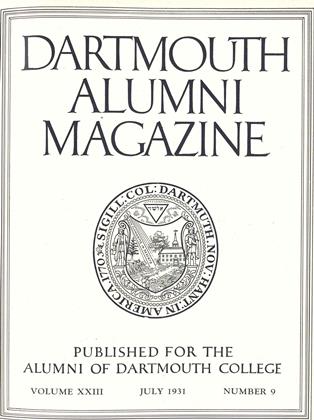Although the excitement of Commencement has gone, and Hanover is again a deserted village, the baseball team at this writing still has a single game to play, although for all intents and purposes the players have closed their season.
Baseball, which is the favorite sport of many, was a great disappointment at Dartmouth this year, and a team which started with so much promise dropped eight of its last nine games and sagged into fourth place in the Eastern Intercollegiate League. It was not a good record for a team which boasted of six tested and tried veterans on the field at every stage of the season.
Perhaps there were some contributory causes, and perhaps the team might be called "the hardest luck Dartmouth team in years," as one of the players said after the Boston College game, but the fact stands that many hopes were broken before May had arrived.
Arthur Boisseau is a real pitching find, and his successive shutouts of Harvard and Yale saw some of the finest pitching in Hanover for several seasons. But Boisseau, the young sophomore who suddenly found himself famous, slumped badly against Columbia and then proceded to lose to Vermont at Burlington and finally to Boston College before a large audience of alumni. Boisseau has everything a good college pitcher needs except experience, and his bump of wisdom will surely grow as the next few years are catalogued.
The loss of Lauri Myllykangas was a terrible blow to the team, for Lauri was one of the finest pitchers to wear the Green. Scouts such as Dick Rudolph, Eddie Collins and Gene McCann had looked over this Fitchburg boy and had appraised his ability. When a pitch went awry in the Virginia game and Myllykangas' career was through, there was a psychological reaction among the team members which was apparent. Despite the fact that Boisseau and Way Thompson turned in good work, there was always the talk of what might have been if Myllykangas had been available. Against Princeton on May 17, Myllkangas was struck on the head by a pitched ball, and it was feared that his career as a second baseman was terminated and he would go down as one of the hardest luck players in Dartmouth's history, but he was back on the job in the latter games of the season.
Perhaps the quotation I gave from the unnamed player is right. Against Cornell on May 19, Way Thompson held the Ithacans to five hits, and yet lost the game by a 4-3 score, making three League losses in a row. Loppy Rich played the full game at second base and thereby won his letter as a sophomore player.
Boisseau pitched a six-hit game against Vermont at Burlington and yet lost the game by a 3-2 score for another heartbreaking performance. The next bill was a double header with Pennsylvania at Philadelphia, which saw Boisseau hold the Quakers to four hits and lose the game 6-3. In the second game Thompson pitched a seven-hit game and lost 4-3, so you can write your own ticket on those games. Previously John Schneider and Tom Maskilieson worked against Williams and held the purple to five hits and lost 9-1!
The last game of the season was with Boston College, and the Eagles brought one of the strongest teams in the East to Hanover, a team which had swept most of its games and had driven the great Capt. Norman Sims of Holy Cross out of the box. Arthur Boisseau made his last Hanover appearance of the year in the box and limited the Eagles to six hits, but was shaded by Jim Donovan of the Eagles 2-0. Donovan, whose brother is a promising candidate for the Dartmouth football squad, asked for the assignment in this game, for it was his last contest for Boston College. His good work extended over the entire nine innings, and Jim Crowley batted him in with both runs.
The baseball team loses six men, and yet we have reason to be optimistic over 1932, for when a group of men are all battling for positions, the competition is keener and the interest higher in the game.
 View Full Issue
View Full Issue
More From This Issue
-
 Article
ArticleAttributes of Vision: The Baccalaureate Address
July 1931 By President Ernest Martin Hopkins -
 Article
ArticleLOCAL ASSOCIATIONS
July 1931 -
 Class Notes
Class Notes1926 in the Hills: The Glorious Fifth
July 1931 By J. Branton Wallace -
 Class Notes
Class Notes1921 Tenth Reunion
July 1931 By Herrick Brown -
 Article
ArticleCharacterizations of Honorary Degree Recipients
July 1931 -
 Class Notes
Class NotesReunion of the Class of '76
July 1931 By Dr. Henry H. Piper
Phil Sherman
-
 Sports
SportsTHE CRIPPLES AT NEW HAVEN
December, 1928 By Phil Sherman -
 Sports
SportsHOBART HOSPITALITY
December, 1928 By Phil Sherman -
 Sports
SportsNO ALIBIS
December, 1928 By Phil Sherman -
 Sports
SportsWINTER SPORTS
JANUARY 1929 By Phil Sherman -
 Sports
SportsOther Winter Sports
FEBRUARY 1929 By Phil Sherman -
 Article
ArticleFootball Scrapbook for 1929
AUGUST 1929 By Phil Sherman








